The Jet Zero Council, a collaboration with industry set up by the previous UK government, has been relaunched as the Jet Zero Taskforce, with the aim of streamlining aviation decarbonisation priorities as the sector strives to reach its net zero emissions by 2050 target. The Taskforce will support the production and delivery of sustainable aviation fuels and zero emission flights, as well as look at how to improve aviation systems to make them more efficient. It will also explore the sector’s demand for GHG removals and the non-CO2 impacts of aviation. The UK’s SAF mandate, which takes effect from January 1, has now officially been signed into law, requiring 22% of all jet fuel to come from sustainable sources by 2040. The government has also started a public consultation on the implementation of ICAO’s global carbon offsetting scheme CORSIA, how it will be regulated in the UK and the penalties for non-compliance.
The restructured Jet Zero Taskforce will feature an annual CEO-level meeting chaired by the UK’s Transport Secretary that will set priorities for tackling aviation emissions and review progress. Members will include the Secretary of States for Business and Trade, and Energy Security and Net Zero, plus CEOs of major airlines such as easyJet, British Airways and Virgin, airports like Heathrow and Manchester, as well as senior representatives from fuel producers, trade bodies and universities.
Below the executive Plenary level will be a smaller Expert Group to support the Taskforce’s priorities, which will be jointly chaired by the Aviation Minister, currently Mike Kane, and Holly Boyd-Boland, VP of Corporate Development at Virgin Atlantic. “By pinpointing key barriers to decarbonisation and directing a select number of smaller action groups to tackle these challenges, this level will be crucial to the delivery of the Taskforce’s objectives,” explained the Department for Transport, which acts as the secretariat.
“Taking up the role of industry chair is a huge privilege and I look forward to working alongside government, with its renewed focus and leadership of the Jet Zero Taskforce,” said Boyd-Boland. “Together, we can harness the ambition across industry to achieve net zero 2050.”
Added Tim Alderslade, CEO of trade body Airlines UK: “Collaboration with government and across the whole sector and supply chain is vital to making the rapid progress we need, and we look forward to working with the new Taskforce to help usher in a new era of sustainable air travel, with all the jobs and investment that entails.”
The first plenary meeting of the Taskforce took place on December 4.
A main priority is to support the development, production, commercialisation and use of sustainable aviation fuels in the UK and also globally. The government will invest up to £450,000 ($570,000) to support aviation decarbonisation measures in other countries, such as helping developing states develop policy and access financing for SAF, as well as to offset carbon emissions from international flights. The announcement coincided with the visit to the UK of the ICAO Secretary General, Juan Carlos Salazar, and the signing of a memorandum of understanding covering all areas of UK-ICAO cooperation.
The UK SAF mandate, which applies from 1 January 2025, has now passed into law. Starting at 2% of total UK jet fuel demand, equal to around 230,000 tonnes, the use of SAF is intended to increase on a linear basis to 10% in 2030 and then to 22% in 2040, after when the obligation will remain at 22% “until there is greater certainty regarding SAF supply,” says the government. The supply of HEFA-derived fuels will be capped after the first two years of the mandate, which will become more stringent over time. A separate obligation (0.2% of jet fuel demand) on power-to-liquid fuels kicks in from 2028 that reaches 3.5% of total jet fuel demand in 2040.
The mandate also introduces tradeable certificates for the supply of SAF, with additional certificates awarded for fuels with higher GHG emissions savings, and a buy-out price mechanism will operate to allow suppliers to discharge their obligation. It is intended that the value of certificates will narrow the gap between the price of kerosene and the cost of SAF, thereby encouraging the production of SAF.
However, the government acknowledges that the mandate alone may not provide sufficient long-term certainty to maximise investment in SAF production in the UK. It has therefore committed through legislation to introducing a revenue certainty mechanism by the end of 2026 to provide investor confidence.
CORSIA implementation
The government has also opened a public consultation on its proposals for how the UK will implement and regulate ICAO’s global Carbon Offsetting and Reduction Scheme for International Aviation (CORSIA), which requires airlines to offset CO2 emissions on international routes above a given baseline (85% of 2019 emissions from international aviation). The consultation seeks feedback on proposed penalties for non-compliance.
It also includes proposals on how CORSIA can be implemented while maintaining commitments under the UK Emissions Trading Scheme (ETS), including how flights from the UK to Europe can be prevented from being subject to both schemes and measures “to ensure airlines are not unfairly burdened”.
Said the government: “This approach also aims to avoid unnecessary price increases for passengers, ensuring the UK’s decarbonisation efforts do not negatively impact those who rely on air travel.”
The UK is one of 129 countries now taking part in CORSIA and, with the mandatory phase starting in 2027, is offering support to other countries to help them participate in the scheme. The UK has already trained 11 other countries in Africa and other regions to apply the scheme.
“The UK is already at the forefront of global efforts to address climate change and carbon pricing schemes play a vital role in decarbonising aviation,” said Aviation Minister Mike Kane.
“The government is committed to supporting the aviation industry and with our Plan for Change at the heart, we’re helping the UK transition to a cleaner future in the most cost-effective way. We welcome all views on how airlines can continue participating in these crucial initiatives.”
The consultation has been welcomed by IATA. “We support the UK government’s plans to adopt and implement the scheme, and encourage countries to prepare for CORSIA implementation in full alignment with the ICAO CORSIA Standards and Recommended Practices, and to make the needed carbon credits available,” commented Marie Owens Thomsen, SVP Sustainability & Chief Economist.
The UK is implementing CORSIA in two parts, the first of which is the requirement to monitor, report and verify (MRV) CO2 emissions, and has already been incorporated into UK law. The second, on which the government is now consulting, concerns the requirement to offset CO2 emissions, including the applicability and calculation of offsetting requirements and cancellation of CORSIA credits, called Eligible Emissions Units (EEUs), and also the interaction between CORSIA and the UK ETS.
Penalties and enforcement for non-compliance with CORSIA’s MRV requirements are consistent with UK ETS legislation and the government proposes this approach is also followed for CORSIA’s offsetting requirements to ensure uniformity. Therefore applying a civil penalty of £100 ($130) for each CORSIA EEU that an aeroplane operator fails to cancel on time, as well as other non-compliance penalties.
The consultation will run until 10 February 2025.
Update 19 December: The Department for Transport has just released a 170-page technical guidance document and also a compliance document on the UK SAF Mandate.
Photo: Heathrow Airport


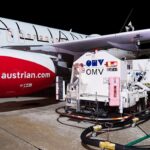
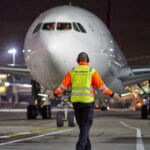




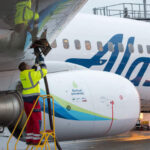
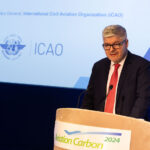



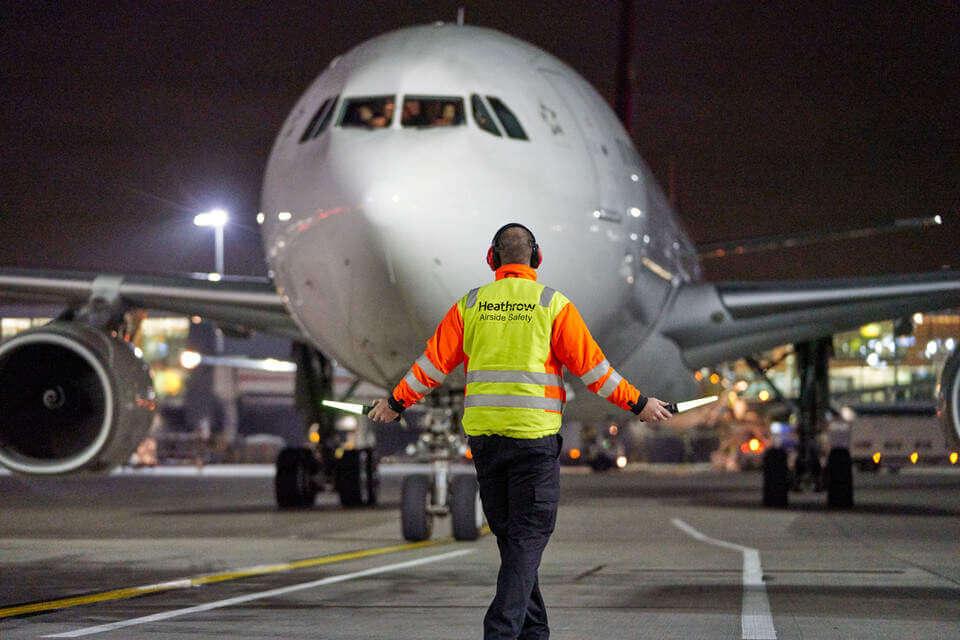


More News & Features
Progress on decarbonising the airline sector has been slow this year, says IATA chief
EASA releases status report on Europe’s SAF production and readiness to meet blending targets
European and US research programmes expand to better understand aviation non-CO2 climate effects
T&E joins aviation and climate scientists in urging action to reduce warming contrails
New study highlights differing strategies and barriers to decarbonising aviation in UK and Europe
Commentary: China’s fair and equitable solution to civil aviation’s climate challenge